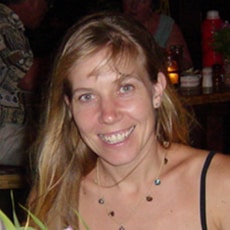“Maths is definitely an excellent foundation to build upon, which opens up many opportunities in a diverse range of fields, from sports science to defence.”
A levels: Maths, Physics and Chemistry.
Tell us a bit about you.
Most recently I have worked on short-term contracts for the University of Bristol, assisting with web projects and scientific outreach. However, most of my time is now dedicated to my children. Before raising a family I was employed in a geophysical research role involving applied maths.
Did you enjoy it?
In my most recent role working on earth sciences web pages, I enjoyed the creative aspect of the role combined with science communication. I also enjoyed the flexibility of my role; my employer provided work from home options and flexible working hours.
Have you always done that job?
After completion of my Maths degree – and because of my interest in sport – I worked briefly as an Outdoor Education Instructor. However, I soon realised I missed maths and science and therefore decided to study for an MSc in Exploration Geophysics. I wanted work in an area that had a strong theoretical element combined with field work. On completion of my MSc I worked as a Geophysicist for an oil-services company.
Whilst working as a Geophysicist, my job role involved a significant amount of applied maths, which linked nicely to my MSc thesis – a project applying Maslov Asymptotic Theory to modelling seismic synthetic waveforms.
How important was Maths in your research career?
Maths has been a significant factor in my career. Without an undergraduate degree in mathematics, I wouldn’t have had the opportunity to work in theoretical geophysics. Maths is definitely an excellent foundation to build upon, which opens up many opportunities in a diverse range of fields, from sports science to defence.
Aside from the number-crunching, how important was the logical way of thinking that maths teaches?
Logical thinking is paramount; working as a geophysicist involves dealing with large data sets, which requires logical thought to process. I also believe logical thinking can applied to problems in all aspects of life, even raising a family!
What challenges did you find when juggling a career and starting a family?
The primary challenges for me were child-care and working hours. I didn’t want to send my children to nursery full-time and there were few part-time posts available. Flexibility was also a key issue, as I no longer had the ability to re-locate where job opportunities dictated.
What advice would you give to anyone looking for a healthy work-life balance?
If possible, I think it is wise to carry on working to some extent (even 1 day per week) whilst starting a family, especially at the beginning of a career. The transition back to work is then much easier when the children are older. To achieve a healthy work-life balance is then down to good time-management and organisational skills, to make time for everyone, including oneself.
Do you have any tips for someone who is thinking about a career in geophysics?
I would recommend studying maths, physics and geology at A level for anyone considering a career in geophysics. Students generally find geophysics easier if they possess a strong mathematical background. Also, geophysical companies are usually more interested in employing students with STEM subjects or geology degrees.






